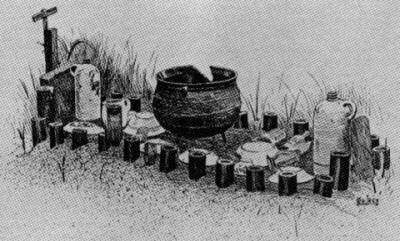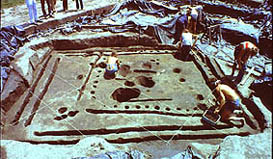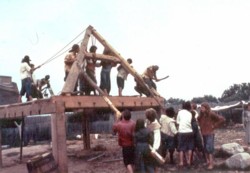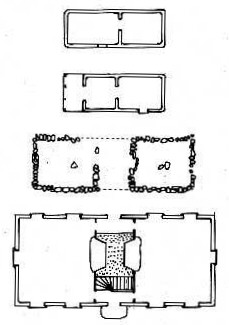Overview
This course provides a contemporary understanding of the pre-Columbian and historic-era cultural histories and social landscapes north of Mesoamerica. The course readings, activities, and discussions will review all portions of the continent from early Paleoindians to later sedentary, warring, and agricultural peoples. Particular regions and time periods contribute to an understanding of theoretical issues concerning the timing and process of the initial peopling of the Americas, food production and the origins of domestication, regional systems of exchange, development of social hierarchies, the rise and fall of chiefdoms, colonial encounters between Europeans and Native Americans, and the historical archaeology of Europeans and Africans in colonial America. These subjects present us with whole chapters of the human experience brought into view through archaeology. Class evaluation will be based on active participation in class discussions, two mid-term exams, and a final seminar paper (15-20 pages in length).

Course Requirements and PoliciesCourse Grading, Exams and Papers
Your course grade will be determined from the grades you receive on two mid-term exams (each counting for 25% of your course grade), a final paper (40%), and a presentation on the topic of your final paper (10%). A brief abstract and outline of your final paper topic is due in class on Nov. 17. Your presentations on the topic of your final paper will be scheduled for the last week of class (Dec. 6-10), and will address the scope of your subject and your plan of analysis, so you can receive feedback and comments from your classmates. The mid-term exams will be in a format of take-home essay exams, for which your completed essays should be 8-10 pages in length (due on Oct. 4 and Nov. 8). Your final papers should be 15-20 pages in length and are due in the Anthropology Department, 109 Davenport Hall, by 12pm on Friday, Dec. 17. All exam essays and final papers should be double spaced, with 10-12 point font and one inch margins.
Attendance and Participation
Your regular attendance and active participation are of central importance for this course to provide you with both a fun and satisfying educational experience. I reserve the right to lower the course grade (by one letter grade) of any student who fails to regularly attend class during the semester.

Required Texts
 Ancient North America, by Brian Fagan, Thames & Hudson (3d ed. 2000). Ancient North America, by Brian Fagan, Thames & Hudson (3d ed. 2000).
 The Archaeology of Traditions, edited by Timothy Pauketat, University Press of Florida (2003). The Archaeology of Traditions, edited by Timothy Pauketat, University Press of Florida (2003).
 Uncommon Ground: Archaeology and Early African America, 1650–1800, by Leland Ferguson, Smithsonian Institution Press (2004). Uncommon Ground: Archaeology and Early African America, 1650–1800, by Leland Ferguson, Smithsonian Institution Press (2004).
 Race and the Archaeology of Identity (Foundations of Archaeological Inquiry), edited by Charles E. Orser, Jr., University of Utah Press (2001). Race and the Archaeology of Identity (Foundations of Archaeological Inquiry), edited by Charles E. Orser, Jr., University of Utah Press (2001).

Class Schedule and Readings:
Week 1. Introduction: Archaeology, Analytic Frameworks, and Stakeholders
Aug. 25: No readings. Aug. 27: Fagan, chaps. 1-3; Traditions, chap. 1. |
Week 2. Archaeology and Stakeholders (cont'd) // First Americans, the Paleoindian Period and Far North
Aug. 30, Sept. 1 and 3: Fagan, chaps. 4-5, 8-9. |
Week 3. Hunting, Gathering and Horticulture in the West and Great Basin
Sept. 6 is the Labor Day holiday. Sept. 8 and 10: Fagan, chaps. 10-12. |
Week 4. From Archaic to Pueblos in the Southwest
Sept. 13, 15, and 17: Fagan, chaps. 13-15. |
Week 5. Eastern Archaic Traditions
Sept. 20, 22, and 24: Traditions, chaps. 12-13; Fagan, chaps. 16-17. |
Week 6. Early and Middle Woodland Period Dynamics
Sept. 27 and 29, Oct. 1: Traditions, chaps. 10-11; Fagan, chaps. 18-19.
First mid-term exam distributed in class on Sept. 27; completed exam essays due in class on Oct. 4. |
Week 7. Late Woodland and Mississippian Developments
Oct. 4, 6, and 8: Traditions, chaps. 9-10; Fagan, chap. 20.
Completed essays for first mid-term exam due in class on Oct. 4. |
Week 8. Middle and Late Mississippian Periods
Oct. 11, 13, and 15: Traditions, chaps. 6-8; Fagan, chap. 20. |
Week 9. Great Plains and the Northeast
Oct. 18, 20, and 22: Fagan, chaps. 6-7, 21. |
Week 10. European Contact and Mission Impacts
Oct. 25, 27, and 29: Fagan, chap. 22; Traditions, chaps. 3-5. |
Week 11. Racial and Ethnic Dynamics in Colonial America
Nov. 1, 3, and 5: Ferguson, prologue, introduction, chaps. 1-2; Traditions, chap. 2.
Second mid-term exam distributed in class on Nov. 1; completed exam essays due in class on Nov. 8. |
Week 12. African American Cultures and Traditions
Nov. 8, 10, and 12: Ferguson, chaps. 3-4; Identity, chaps. 3, 9.
Completed essays for first mid-term exam due in class on Nov. 8. |
Week 13. Archaeological Approaches to Concepts of Race, Ethnicity, and Identity
Nov. 15, 17, and 19: Identity, chaps. 1-2, 4-5.
Abstract and short outline of final paper topic due in class on Nov. 17. |
Thanksgiving Break!
Nov. 20-28. |
Week 14. Approaches to Concepts of Race, Ethnicity, and Identity (cont'd)
Nov. 29, Dec. 1 and 3: Identity, chaps. 6-8. |
Week 15. Some Dynamics of Race and Class in 19th Century America
Dec. 6, 8, and 10: Identity, chaps. 10, 12.
Student presentations on final paper topics during this week. |
Final Paper.
Due by 12pm on Friday, Dec. 17. |

Additional internet resources on anthropology and archaeology, which are suggested only and not required reading for this course, are available at:
http://www.anthro.uiuc.edu/faculty/cfennell/bookmark2.html.
Additional internet resources on African and African-American archaeology, cultures, and history, which are suggested only and not required reading for this course, are available at: http://www.diaspora.uiuc.edu/bookmark3.html.

Last updated: July 12, 2008
|

